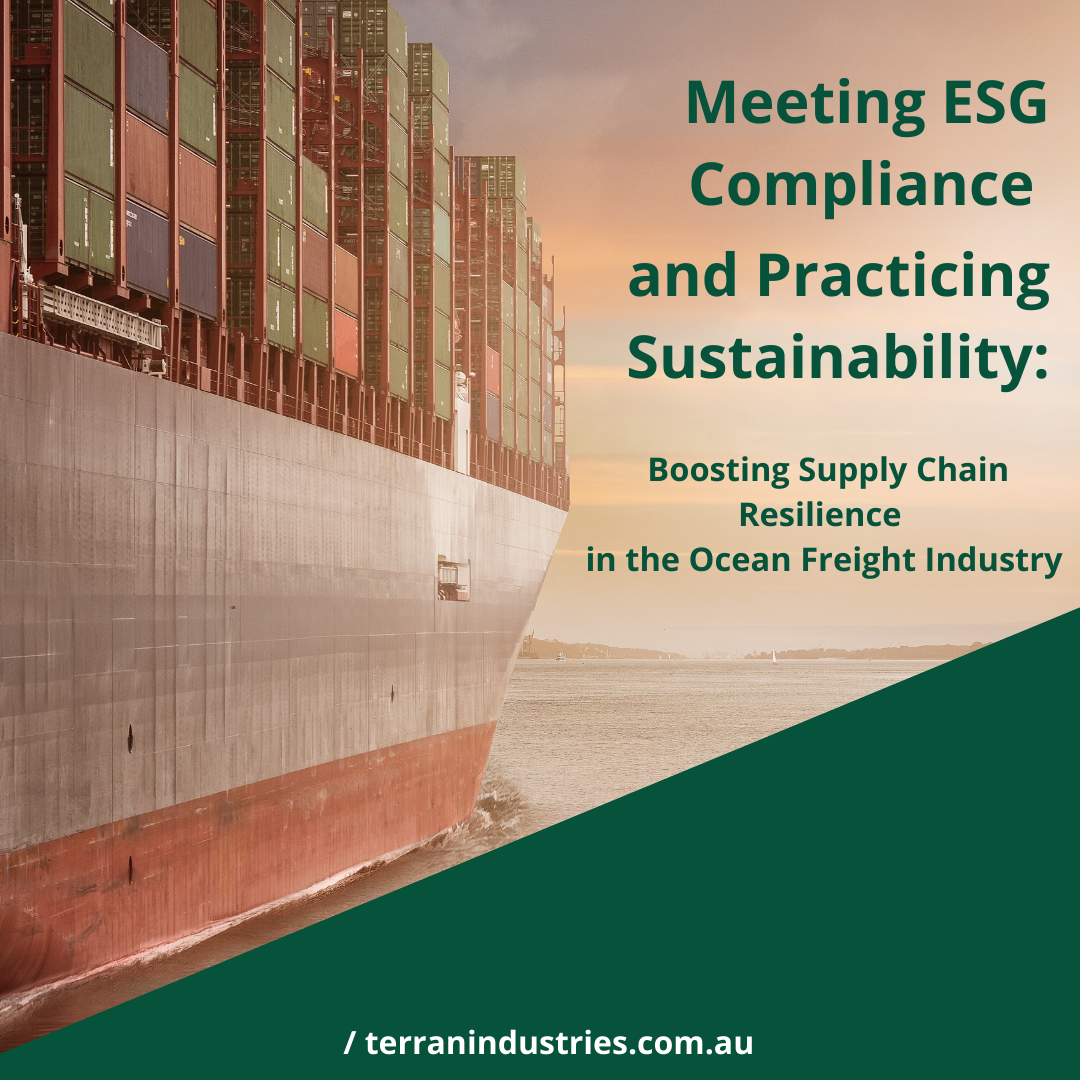BusinessSustainabilitySupply ChainBoosting Supply Chain Resilience in Ocean Freight

The ocean freight industry plays a vital role in global trade, enabling the movement of goods across continents and connecting businesses worldwide. However, this industry also faces numerous challenges, including climate change, environmental degradation, and evolving regulatory frameworks.
To address these concerns and ensure long-term sustainability, ocean freight companies must prioritise meeting Environmental, Social, and Governance (ESG) compliance standards and adopt sustainable practices. By doing so, they can not only contribute to safeguarding the environment, but also enhance their own supply chain resilience. This article explores how meeting ESG compliance and practicing sustainability, can enable the ocean freight industry to boost supply chain resilience.
Environmental Responsibility: Mitigating Climate Change and Preserving Marine Ecosystems
The ocean freight industry is a significant contributor to greenhouse gas emissions, mainly through the burning of fossil fuels. By embracing sustainable initiatives such as using alternative fuels, optimising vessel routes, and investing in energy-efficient technologies, companies can reduce their carbon footprint and mitigate climate change. Transitioning to cleaner energy sources like hydrogen or exploring innovative solutions like wind-assisted propulsion systems can significantly reduce emissions.
Furthermore, sustainable practices should extend beyond emissions reduction. Implementing effective ballast water management systems, reducing ship noise, and minimising marine pollution can help preserve the delicate balance of marine ecosystems. Protecting biodiversity and marine habitats is crucial for long-term supply chain resilience, as healthy oceans ensure the continued availability of marine resources and support the overall stability of the industry.
Social Responsibility: Ensuring Fair Labour Practices and Safety Standards
Meeting ESG compliance standards in the ocean freight industry also involves prioritising social responsibility. This includes ensuring fair labour practices, promoting worker safety and well-being, and supporting the communities where companies operate. By investing in employee training programs, providing safe working conditions, and ensuring fair wages, companies can attract and retain a skilled workforce while fostering a positive company culture.
Furthermore, by actively engaging with local communities and supporting initiatives that promote education, healthcare, and social development, ocean freight companies can build strong relationships and enhance their social license to operate. This community engagement helps create a favourable environment for business operations, reducing the risk of disruptions and enhancing supply chain resilience.
Governance: Transparency, Compliance, and Risk Management
Strong governance practices are essential for maintaining trust and credibility in the ocean freight industry. By prioritising transparency, companies can disclose their sustainability efforts, progress, and performance to stakeholders. This transparency not only demonstrates a commitment to ESG compliance, but also facilitates informed decision-making for investors, customers, and partners.
Compliance with regulatory frameworks and international standards is another crucial aspect of good governance. Staying updated with evolving regulations, such as the International Maritime Organization's (IMO) sulphur emission limits, or the Ballast Water Management Convention, ensures companies remain legally compliant as well as minimising the risk of penalties or operational disruptions.
Moreover, effective risk management strategies must be in place to address potential disruptions to the supply chain. By identifying and mitigating risks associated with climate change, labour disputes, political instability, or cyber threats, companies can proactively protect their operations and maintain a resilient supply chain.
Conclusion
Embracing sustainability and meeting ESG compliance standards in the ocean freight industry, is not only essential for preserving the environment but also for building a resilient and prosperous future. By reducing emissions, safeguarding marine ecosystems, promoting fair labour practices, and upholding strong governance, companies can fortify their supply chains against disruptions.
A resilient supply chain enables businesses to adapt to evolving challenges, maintain trade flows, and foster stakeholder trust. Embracing sustainability is no longer an option but a strategic imperative for the ocean freight industry, ensuring a sustainable and thriving future for all.

Evannah Jayne
Founder & CEO
A passion for sustainability and a desire to change the world, Evannah seeks to raise awareness of the important issues surrounding our planet today.
